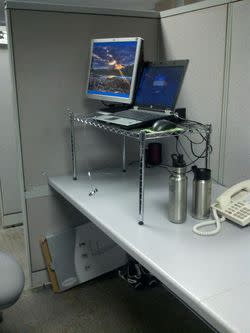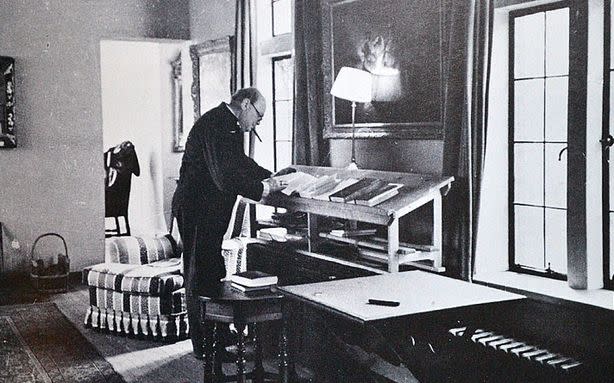The Backlash Against Standing Desks Has Begun
He was a strange one, this editor I worked with, with his pencil mustache and black turtlenecks and an iPod headphone bud always in one ear, as if he were half in our shared world and half in his own. But the strangest thing about him was that he worked at a standing desk. This, at a newspaper where, until not all that long ago, you could send out a copyboy to fetch you whiskey.
RELATED: Will Marty Peretz Ever Write for The New Republic Again?
The standing desk was a thing of wonder, like the monolith from Stanley Kubrick’s 2001: A Space Odyssey. There he stood all day, working. Curious, I asked someone where he had acquired this wondrous instrument and whether I, too, could spend my days on two feet. I was told that it had been an expensive “union job” for which one needed a doctor’s note. This meant that I should not ask again.
RELATED: Tina Brown Has Lots of Love For New Republic's Gentle Mocking
The stories about the evils of sitting are so legion, there is no real need to repeat them. Suffice it to say that you should not spend your entire day on your derrière. And barring employment full of perambulation, a standing desk has become an increasingly viable solution for office workers. At the very least, it’s less silly than one of those bouncy balls. Come to think of it, there was one of those in the newsroom, too.
RELATED: Chris Hughes Is Making Big Moves with The New Republic
As with all things that gain popularity, the standing desk now faces a backlash. This morning, The New Republic published a piece called “Screw Your Standing Desk!: A Sitter’s Manifesto,” in which Ben Crair writes:
Of course the long, stationary workdays of most Americans are unhealthy. The solution should not be to sit less, but to work less. If sitting is as bad as the doctors say—and I’m sure it is!—then why not prescribe longer lunch breaks, shorter hours, and more vacation? You can still be chained to a standing desk. Is it any surprise that its biggest fans are the paternalist creeps of Silicon Valley?
Crair then interviews several writers, all of whom express displeasure with the notion of writing while standing – though the practice was endorsed by Ernest Hemingway, Thomas Wolfe and Philip Roth, among others.
RELATED: Polish Up Those Résumés: The New Republic Is on a Hiring Spree
Zoë Heller told Crair that standing while writing “was never going to happen,” evein if Roth did it, adding that “the cigarette and Diet Coke habit is a much more pressing concern.” Geoff Dyer, the essayist, also offered a similar endorsement of sitting. Gary Shteyngart, playing the part of the famously supine Oblomov, went even further: “I do not sit. I lie.”
RELATED: Susan Orlean is Plagued by Lazy Animals
Crair celebrates authorial sitting the way earlier generations defended authorial drinking – dissolution for the sake of the muse, Rimbaud’s “derangement of the senses” in an Aeron chair.
Crair argues for sitting as intrinsic to creativity:
A culture that requires standing or treadmill desks in the workplace produces a literature mainly about “the compulsion to announce constantly that you are working at a treadmill desk” [in the words of Susan Orlean]. A culture that tolerates sitting is one where people can apply their minds to something else.
Meanwhile, Salon’s Alex Seitz-Wald tweeted in response to Crair’s piece, “I will happily go to war in defense of sitting.”
This backlash tends to treat the discourse around standing desks as identical to the actual use of standing desks. Vegetarians are annoying, but that doesn’t mean they don’t have a point about red meat. What seems to really frighten Crair is that the physical dangers of sitting will lead to a Bloomberg-type public health campaign to make us all stand for nine hours a day. As if similar campaigns by New York’s so-called “nanny” against smoking in bars and for increased biking have proven all that nefarious (or unpopular).
Moreover, there is no link between sitting and creativity. If anything, standing is very close to walking, and walking is believed by many to foster the very kind of creative thinking Crair thinks will disappear if we use standing desks.
As Kierkegaard once wrote, “Above all, do not lose your desire to walk.” That’s hard to do if you’re eternally sitting down.
Photos: Winston Churchill at standing desk, via Flickr; office standing desk by Tomas Quinones, via Flickr.



